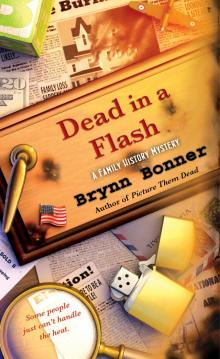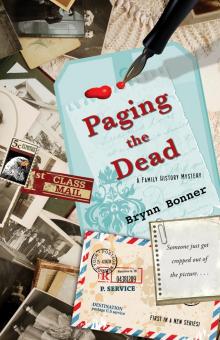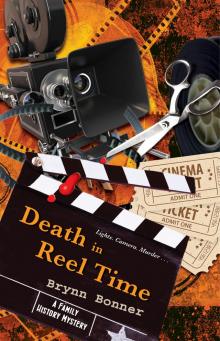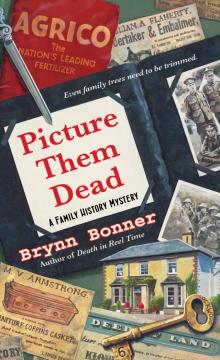- Home
- Brynn Bonner
Paging the Dead Page 13
Paging the Dead Read online
Page 13
“But a tasteful one,” Linda said, wiping at her cheeks again. “Honestly, it wasn’t unusual for Vivian and Dorothy to quibble. They had, let’s say, spirited discussions about a lot of things—mostly silly things in my opinion. Clothes, food, even hairstyles. From what I overheard Dorothy must have upset Vivian by saying something critical about her hair that day, too. But I guess all that just proves how close they really were. They squabbled but they stayed friends.”
“Vivian told us herself that Dorothy schooled her in the refinements well-to-do clients expect in their events when she was just starting up her business,” Esme said. “Guess she missed the lesson about no loos on the lawn.”
“No privy on the patio,” Marydale chimed in.
“No latrines on the lanai,” I contributed.
This instigated another round of giggles and just then Coco appeared in the doorway from the kitchen. She took in the scene with a perplexed expression.
“I don’t know this game,” she said. “But how about no toilets on the terrace?”
fourteen
I DON’T CLAIM TO BE DEVOUT, BUT ON THIS SUNDAY MORNING I had the urge to attend mass. I craved the solace of ritual and assurances the angels were on our side. Or maybe it was plain old guilt. I’d judged Dorothy Porter without taking the trouble to get to know her. And I should know better.
I’ve spent my adult life poring over diaries and letters, people’s most pressing concerns and private thoughts committed to paper. I’ve learned things are seldom as simple as they seem and nothing ever really begins when you think it did.
I got to St. Raphael’s early and headed for the side chapel to light a candle. I’d done this every Sunday with my mother as I was growing up. During the week we kept a list of people who needed prayers for one reason or another and before mass we’d slip the little piece of paper under a votive holder and Mom would let me light the candle and put the quarter in the slot.
I’d heard the parish council had recently decided the votive candles posed a fire hazard and were soon to be replaced by artificial candles. Say your prayer, deposit your money and flip a switch. An LED blinks on and even gutters like an actual candle in the breeze.
No, thank you.
I struck the match and set flame to wick, then deposited a folded dollar bill, the price of sending prayers heavenward having risen along with everything else. I prayed for Dorothy and for all those who’d care about her, even the ones who were presently acting like horse’s patoots. I didn’t mention any names; I figured God would know.
My devout grandparents would have been scandalized by my irreverence. They’d been so devout my mother was convinced the main reason they’d adopted her was because they felt like failures as good Catholics because they were childless. Whatever their motivation, they were loving parents and Mom felt fortunate to be their daughter. But that hadn’t kept her from longing to know more about where she came from and why her biological parents gave her up. She’d searched all her life and never found the answers she was looking for. And now I continue the search for her—and for me.
I’d been baptized in this church and made my first confession to the priest here. I’d been such a goody two-shoes I’d had to make up something to confess, and Father Donovan had told me gently that was called lying and that I then had something real to confess. I’d been delighted at how that’d worked out.
I slid into a pew toward the back of the church and as the processional started I sensed someone moving in beside me. Instinctively I shuffled down a spot without looking over.
“Are you out of your mind?” the person hissed in a whisper and I looked up to see Jack’s face looking like a thundercloud.
“What?” I whispered back.
He picked up a hymnal and flipped at the pages, but out of the side of his mouth he hissed again. “You went to see a suspect without even telling the police. What were you thinking, Sophreena?”
The music stopped and the woman in the pew ahead of us glanced over her shoulder. She packed a lot of disapproval into that one quick glance and we put our wrangle on hold until mass was over. But the moment the priest urged us to go in peace Jack started in again. “I can’t believe you did that, Sophreena. I thought you had more sense than that.”
“For pity’s sake, Jack, I didn’t know he was the guy who’d been at Dorothy’s house until after we talked to him. And anyway, it wasn’t like he was going to kill me right there in the middle of a coffee shop. And I wasn’t alone, Esme was with me.”
“Still,” he said, grabbing my elbow and steering me out the side door, “Julie says this guy is now the number one suspect in Dorothy’s murder. She thinks he looks good for it.”
“He didn’t kill Dorothy,” I said, loud enough to make a couple of people on the sidewalk turn in our direction. “He’s not like that,” I said, lowering my voice. I wasn’t sure if I truly believed Hank Spencer was innocent or if I just wanted Julie to be wrong.
Jack threw his hands in the air and gave an exasperated grunt.
“It looks bad,” I allowed, “but I’m telling you, it wasn’t him.”
“Just don’t do anything like that again,” he said, as he stomped alongside me to the parking lot. “Where’s your car?” he demanded.
“I walked,” I said, scanning the lot for Jack’s Jeep.
“Great!” he said. “I left mine at the coffee shop. I was gonna ride back with you.”
“Well, that gives you six blocks to yell at me some more,” I snapped. “Because I’m really enjoying that!”
In the parking lot people were standing around in clusters talking, but it clearly wasn’t the usual cheerful chatter about the weather, golf scores and where to go for post-mass brunch. These conversations were punctuated with furrowed brows, pinched lips and long faces. Jack wasn’t the only one on edge.
St. Raphael is the patron saint of protection from nightmares. The whole town was living a nightmare right now. I hoped they’d hold out on the LEDs. We needed that whole bank of vigil candles, and we needed the real thing.
Though it was still only mid-morning the temperature had edged up into the high eighties already and was showing ambition. I unwound the scarf I’d looped around my neck to dress up my plain pants and T-shirt and wiped my forehead with it before stuffing it into my bag.
The heat seemed to have knocked the stuffing out of Jack as well and he was quiet as we started our trek toward Top o’ the Morning.
I wanted to ask him what was Julie to him anyway, but instead I asked how he was coming on his family history search.
“Still stuck,” he said.
“You’ve been stuck for a long time. Have you lost interest?”
“No, I’m still interested,” Jack said. “I want to know if I’m related to Robert Ford, but I guess part of me doesn’t want to be related to him. I’ve been thinking, do I really want that to be part of who I am? Somebody who’d kill a friend? Yeah, Jesse James was an outlaw, but Robert Ford was supposed to be his pal. Where was all that honor among thieves thing? And the way the story goes, he shot James in the back—the most cowardly thing a man could do back in those days.”
“Not too well thought of these days either,” I said.
“Right,” he said, giving me the lopsided grin. “Anyhow, I’ll get back to it soon. You want some help with the Pritchett books this afternoon? I’m not so good at pretty pages, but I’m an ace with a paper cutter.”
I was thrilled his afternoon was free—of Julie. Then ashamed. If Jack had reconnected with someone he enjoyed being with I should’ve been happy for him. What kind of a friend was I, anyway? A grossly inferior one, apparently.
Just as we reached Top o’ the Morning I saw Esme getting out of her SUV across the street. She called out to us and though her bearing indicated she thought she owned the street, she let a car pass before she strode over. She always dresses nice, but for church she goes all out. Esme’s a big woman, but her proportions are spot on and she was wearing a georgette dress t
hat highlighted that. It had a full skirt that allowed plenty of motion when she walked.
We snagged a table outside while Jack went in to put in our order. Esme filled me in on what she’d gotten accomplished this morning as I brushed crumbs off the table and wiped it with a tissue she’d fished from her purse. I told her Jack had volunteered to help out this afternoon and she laughed. “The cavalry’s coming over the hill,” she said. “All the others are coming.”
As the three of us sipped our coffee we strategized on how best to use our free labor pool. “I won’t be back until about one,” Esme said, “so just put whatever I need to do on my worktable.”
“You got something after church?” I asked.
“I’m having lunch with Detective Carlson,” she said, her look daring me to comment. “I told him I’d meet with him and see if there’s anything useful we can contribute about Dorothy and that’s what I’m doing. And that’s all I’m doing.”
Just at that moment a woman approached our table. It took me a moment to place Leticia Morgan, Denny Carlson’s ex-wife. A man I figured must be her husband trailed behind her. He seemed cool as a cucumber even in his dark suit while the rest of us had beads of sweat popping out on our foreheads like bubble wrap.
I braced myself for whatever kind of altercation was coming, but Leticia Morgan introduced herself and her husband, friendly as can be, then dispatched hubby to get her a latte.
After he’d gone Leticia sat next to Esme, perching on the chair as if ready for flight. “I just wanted to meet you,” she said, “and have a chance to tell you that even though Denny and I are divorced I still consider him a friend and one of the best men I know. It didn’t work out for us, but I want him to be happy.”
Not waiting for a reaction, she rose and headed for the door without a backward glance.
“Oh Lord,” Esme said. “First you, now I’m gettin’ it from her? What is wrong with this man that he needs this many people lobbying for him? His mother’s even gettin’ into the act.”
“When did you meet his mother?” I asked. “Does she live around here?”
“No,” Esme answered.
When she didn’t elaborate Jack asked, “Where does she live?”
“She doesn’t,” Esme answered with a sigh.
“Ooh,” Jack and I said in unison.
• • •
I decided to have Jack help me archive materials to clear workspace for the reinforcements. He smirked as he pulled on the cotton gloves I handed him. “You know, every time you make me wear these things I feel like a mime. Maybe you ought to give me a striped shirt and beret to go with them and I’ll make like I’m trapped in an invisible box.”
“Scoff all you want,” I said. “Your oily fingers can do a lot of damage to these fragile photos.”
“I washed my hands,” he grumbled, “used soap and everything.”
“Stop your griping and help me with this.” I pointed to a stack of Harrison Pritchett’s company papers. I quickly sorted through them to make sure no personal items had accidentally gotten mixed in and handed them off to Jack to seal into airtight bags. There was a near-zero probability these items would ever be needed again but it wasn’t my call to cull. Dorothy had gone through only two small boxes of material before she decided she’d rather pay us to inventory and organize the whole lot than risk breaking a nail.
Business papers stowed away, I turned to the personal materials, carefully dividing a mound into smaller piles.
“What’s this?” Jack asked, looking over my shoulder as I inserted vellum sheets between the pages of a commonplace book kept by Harrison Pritchett’s mother, Laurena Bascom Pritchett. “Is that a baby book? It looks old.”
“It’s very old, from the 1860s. But not a baby book exactly. Commercial baby books weren’t around until a couple of decades later. Scrapbooks either. People like Laurena made homemade books of friendship or remembrance from whatever materials they could lay their hands on. Somewhere around the turn of the century they started calling them memory books or scrapbooks and companies started producing blank albums.”
“But isn’t that baby measurements there?” he said, pointing to a page that had been constructed on the cover of a seed catalog.
“Yeah, it is. It wasn’t that parents didn’t write down things about their babies, they just didn’t parse out their lives. They put everything together in the same book. A little bit diary, a little bit sketchbook, accounts for the farm or household and a place to save the ephemera of daily life. This little book will break your heart. Laurena’s young husband, Lawton Pritchett, went away to the Civil War when their baby, Harrison, was an infant. He was killed and Laurena never remarried. She raised Harrison on her own.”
“Wow, that’s what really gets you when you start looking into your history,” Jack said. “There are so many forks in the road where if a different decision had been made or if the timing had been a little off you wouldn’t be here.”
“Makes you feel lucky to be alive, doesn’t it? Laurena Pritchett was writing all this about the baby for her husband,” I said, pointing to a densely written paragraph, “and all the while Lawton was already dead. The word just hadn’t reached her yet.”
“You can read that?” Jack said, squinting at the passage written in scratchy handwriting with fading ink.
“I’ve gotten pretty good at reading these old scripts. Course, it helps that I can scan them and manipulate the size and contrast. This seems to be a log she was keeping for Lawton for when he returned so he wouldn’t miss out on all baby Harrison’s milestones. She tells how he’s grown fat and happy, despite the deprivations of the war. Then here she writes that instead of placing a lock of hair from his first haircut she’d had to gather blond hairs from his baby brush to prove he wasn’t totally bald.”
“Is that what’s supposed to be right there?” Jack asked, indicating a rectangular blank spot on a page otherwise covered with writing.
“Yeah,” I said. “I could have sworn there was an envelope there when we first found the book, but it must have fallen off. Keep an eye out for it.”
I sandwiched the book between two pieces of acid- and lignin-free chipboard and taped it with archival tape before handing it to Jack to vacuum seal.
“I’ll bet half the people who do this kind of thing don’t even know what lignin is,” Jack said.
“Probably doesn’t mean the same thing to an archivist that it does to you botany people. For me it means impurities in paper pulp. That’s bad.”
“And for me it means something the plant needs to form woody tissue. That’s good.”
Winston and Marydale came in just then and placed two large bags on the floor inside the door. The bags undulated and wiggled until two topknots and four black eyes appeared in the openings. Ordinarily pets would be verboten in the workroom, but Gadget and Sprocket get special permission since they don’t shed. Maybe they just don’t have a chance to since they get brushed and petted so much. We make sure we keep them away from the artifacts and they’re generally content to sleep in their little bag beds when they aren’t running around in the backyard.
Winston bent down and scooped up a pup in each of his big hands, clutching them to his chest. “Oh, for Pete’s sake,” he said, tsking. “Marydale, you’ve gone and put bows in their hair? Man’s gotta be confident in his manhood to tote around dogs looking like this.” I watched through the window as he took them into the yard and placed them on the grass. They trotted off to explore with their little button noses twitching.
I’d made design templates for the pages and we set up an assembly line with Winston and Jack trimming and mounting, then Marydale adding embellishments and finally me working on journaling and labeling. There was no time for handwritten calligraphy at this point so I selected a nice heritage font and began transcribing on my laptop. I printed in brown ink on a faux parchment, then trimmed the journaling boxes to size and chalked the edges with an umber chalk to make them look aged. The labels I to
re with a deckle-edged ruler and dipped the ragged edges into walnut ink so they’d stand out on the page.
“You know, my dad worked on this house,” Winston said, holding up a photo of High Ground when it was under construction. “He was a cabinetmaker. He loved working that High Ground job. Talked about it for years. Nothing but the best materials and he always said Harrison Pritchett was a good man to work for.”
“They broke with southern tradition, didn’t they?” I said. “Everyone back then seemed to be building another Tara but Harrison and Sarah decided on a craftsman style. There are so many built-in drawers, shelves and cupboards. Did your dad build them all?”
“No, not all,” Winston said. “From what my dad told me there were lots of workmen. Let me think now, he worked on that house when my sister was a baby. I wasn’t even born yet. Must have been along about thirty-seven or thirty-eight.”
“They broke ground for it in May of 1936 and Harrison and Sarah Pritchett moved in just before Christmas 1937,” I answered, reading from my report. “According to what Harrison told the historical society it had always been his intention to build a house on that acreage from the time he moved here in 1895 but he had to wait until he had enough money to build a house worthy of the site.”
“Well, he sure did that,” Winston said, “though the one he vacated wasn’t anything to sneeze at.”
“That was the middle house,” I said. “Bigger and definitely better than the little cabin he and Sarah lived in when they first moved here.”
“Is the middle house the one there on Alta Vista Drive?” Marydale asked. “The one Dorothy and Ingrid grew up in?”
“Yep,” Winston said. “It’s not nearly as grand as High Ground, but it’s a nice house. Harrison and Sarah gave it to William and his wife, Leila, when High Ground was finished. My dad did some renovation work on that house, too, but he wasn’t nearly as happy about working for Dorothy’s father. Dad always said William Pritchett wasn’t a man who’d do to ride the river with.”

 Dead in a Flash
Dead in a Flash Paging the Dead
Paging the Dead Death in Reel Time
Death in Reel Time Picture Them Dead
Picture Them Dead